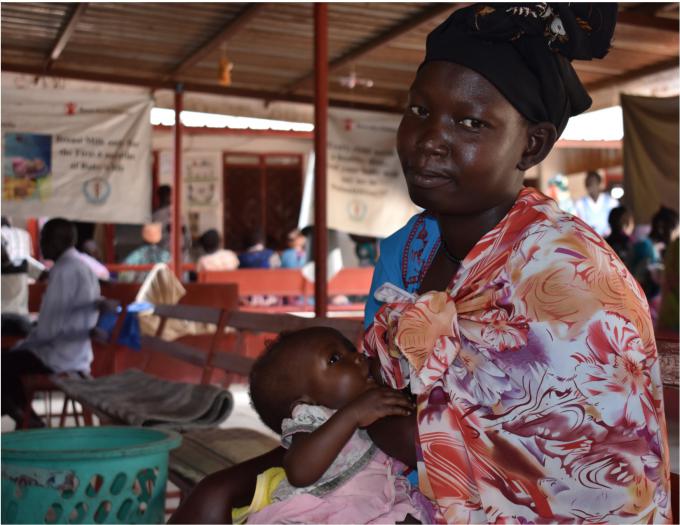Providing Free Integrated Health Service Saves Lives, Enables Women to Save Money for Buying Food

After the border conflict in Abyei Special Administrative Area in 2011, health facilities remain disrupted. Few government Primary Health Care Centres have no drugs and health workers to save lives of hundreds of thousands residents in Abyei. The economic meltdown and high inflation rate of over 300 percent made government health workers to abandon their jobs for a greener pasture.
Abuk, 22, and her family is among those lacking better health services in Abyei. Neither Health service nor enough food she has for the family. Before, the nearest health, facility to treat her 3 children was a government hospital and has no enough drugs. Save the Children’s integrated health and nutrition program brings hope to Abuk’s life and her children. This time, Abuk brought her 11 months child who has recovered from malnutrition, fever and malaria, a diseases linked to lack of enough basic service and poor health service information. Abuk has been visiting Save the Children’s health facility for more than five times to save her children’s lives. The free medical service also helps Abuk to save money for food and other basic family needs.
Abuk said:
“Since I started to come here at Save the Children Clinic, everything is free. They also counsel me on health related issues like taking care of our children’s hygiene, bring our children to health facility if the child isn’t feeling well, washing hands, before and after preparing food for children and how to feed and take care of children”.

Adeng* 37, sells poles and grass to make money, but it is not enough to buy food as prices have soared. The family does not have enough food to eat and the children are hungry at most times. The only meal that Adeng* can provide is porridge or boiled sorghum (a cereal). When Adeng’s children are sick, she does not have money to treat them in a commercial clinic. Because of poverty and poor feeding, under five diseases like malnutrition, diarrhoea, fever and malaria is common among Adeng’s children.
This time, Adeng brought two of her children for treatment at Save the Children health facility in Abyei. The children are suffering from malnutrition, diarrhoea and malaria and are responding well to medication. Without a free health service in Abyei, many families are at high risk from childhood diseases that kill. Adeng is glad of Save the Children’s free support to children and her family.
“Now, I brought my one-year daughter, Susan and my 8-year boy. For the two, this is the second time I am bringing them here to complete doses for fever and diarrhoea, cough as well malnutrition. Since then, treatment here has been very successful. I am appreciating Save the Children. This place is important to me because it is for free. It could be good for us to have more health centres near our neighbourhood, so that we can easily access it”, said Adeng.

This is the third year that Save the Children in implementing life-saving health and nutrition interventions project in Abyei with support from European Union (ECHO). The program targets population of about 76470 people. We provide free lifesaving primary healthcare services whilst, nutrition, food security and livelihood. We strengthen the capacity of the local health system to prevent, detect, and respond to outbreaks of common epidemic prone diseases.
Abyei Special Administrative Area has long been disputed territory between South Sudan and Sudan. Now it resembles a No Man’s Land. It has greatly suffered because of the wars between the two countries. This has left most of Abyei people crumbled, neglected and its population forgotten. There are no free primary healthcare providers apart from Save the Children and other limited humanitarian response actors.
In entire Abyei, we have reached 44, 760 people (children 10,837 and 33,923 Adults) with lifesaving services including health Nutrition and livelihood. Thanks to our Donor ECHO for the support. Our health and nutrition program reached 57,4391 children and 23,7344 adults’ people as of December 2019.
Written by: Tito Justin
 South Sudan
South Sudan